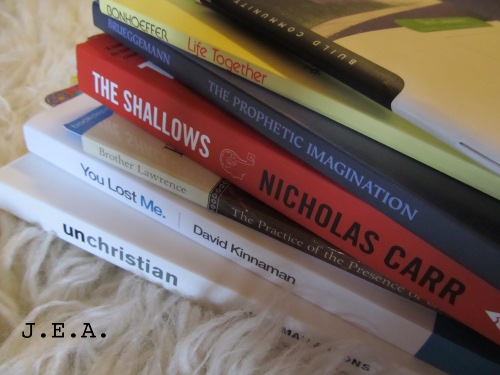Seven Bookish Notes for Students

One: When you read, whatever you read, keep a pad of Post-it notes by your side.
You never know when you’ll trip over a thought, in the midst of your reading, that you’ll want to include in an essay. Sometimes it’s in an unlikely book that you’ll find a quote that will give your essay a breath of life, a spark of uniqueness. Recently, while writing an essay about William Wilberforce, I found myself asking, “Where did I read such-and-such?” I knew I’d read it recently in one of half a dozen books, but I couldn’t remember which one and I didn’t have time to read all the books again. Every time you discover an idea or a quote that’s interesting or inspiring, mark it with a Post-it note. Remove the note when you’ve included the thought in an essay, so you don’t use the same thought over and over again!
Two: Read as widely as possible.
It’s tempting, when life is busy and the pile of books on the floor beside your desk seems to miraculously grow on its own, to read only the books you “have” to read in order to complete a particular module of your course or write a particular essay.
Do you remember when reading wasn’t a chore? When reading was something you “got” to do when schoolwork and chores were done? When reading was something you did when you were tired and should have been asleep for hours already?
Find a moment here and a moment there to read books about things that interest you — beyond your class or course. For me, that’s history and literature and nature, for you it might be astronomy or something else! Just make sure that you’re filling your mind with words of quality and truth. Take a risk, but skip the romance novels at the checkout desk of the supermarket. And don’t forget to mark any passages that you might be able to include in an essay. Seriously. I’m quoting from The Shallows in an essay about community this term!
Three: Be creative when you source your books.
Ask friends for recommendations. They may suggest some books you haven’t thought of reading or even be kind and let you borrow their copies so that you don’t have to buy all the books you need or want to read! I prefer reading books recommended by people I know and trust rather than by Amazon.
Four: Take a deep breath and realise that you won’t be able to buy and read all the books you “might” need for a module or an essay.
Buy or borrow the ones you have to read and any others that friends recommend or you think will provide a valuable contribution to your work. Provide business for your local bookshop or make the most of deals on Amazon Marketplace depending on your conviction and the state of your finances. Then do what you can with what you’ve got and rest in the knowledge that you’ve done your best.
Five: Make good use of your Amazon wishlist.
Actually, I record the contents of my list on cards and keep them in an index box, but I’m always popping titles onto my wishlist because they look interesting. Often I take them off my list later, but sometimes I leave them on my list and, a few months later, there it is — the book with the name I don’t remember that is nonetheless exactly what I need now!
Six: Learn to multitask to get course books read.
When you have a deadline to meet and you have to be away from your computer, take a book with you and do some of your course reading in the odd moments you have between errands or appointments. You can read anywhere — in a car, in a waiting room, on a park bench. Don’t forget to take a pad of Post-it notes and a pen too!

Make it a day of rest for your mind and your heart. Read a book that has nothing to do with your degree or read a novel. This is the day to read an old favourite like Little Women or try a new recommendation from a friend. I’d never recommend a trashy novel, but I do suggest that this is the time for a fun, lighthearted book like Pride and Prejudice or A Damsel in Distress!

I loved it, I am actually taking a little break from my regular occupations, and I really miss reading books that have nothing to do with Law, thank you very much, this made me smile.
Thanks! Wow … I can’t imagine reading books to do with Law. I don’t think I have a legal sort of brain! 🙂 I really admire your tenacity in sticking with those books! All the best with your reading and other occupations! 🙂
Great advice! I love reading, and with school I often have a hard time balancing the “have to read” books and the “for fun” books. I love your idea about leaving Sundays free of school books and reading something light. I might try it. And I love the post-it note idea; I should do that more often! Thanks for the tips.
You’re welcome! 🙂 Oh, balancing the “have to read” books and the “for fun” books is hard, yes. I hope the idea of leaving Sundays from of school books helps! 🙂 All the best with your studies!